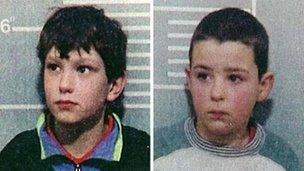Jon Venables' grotesque crime is not reason enough to unmask his identity 25 years after killing James Bulger
One has to wonder whether there can be any sustainable, legal basis for seeking to have the original injunction overturned, as presumably Ralph and Jimmy Bulger would argue for


Your support helps us to tell the story
From reproductive rights to climate change to Big Tech, The Independent is on the ground when the story is developing. Whether it's investigating the financials of Elon Musk's pro-Trump PAC or producing our latest documentary, 'The A Word', which shines a light on the American women fighting for reproductive rights, we know how important it is to parse out the facts from the messaging.
At such a critical moment in US history, we need reporters on the ground. Your donation allows us to keep sending journalists to speak to both sides of the story.
The Independent is trusted by Americans across the entire political spectrum. And unlike many other quality news outlets, we choose not to lock Americans out of our reporting and analysis with paywalls. We believe quality journalism should be available to everyone, paid for by those who can afford it.
Your support makes all the difference.The shock waves caused by the murder of James Bulger in 1993 continue to reverberate even a quarter of a century after the toddler’s death.
For James’ family, that is inevitable. They lived every parent’s worst nightmare and have had to try to deal with the trauma ever since. Not only that, but the shocking and high-profile nature of the crime committed against James has meant that they have had to grieve in the full glare of the media. It is frankly impossible to imagine what they have had to go through; and what they continue to experience.
For the public at large, the horror of James’ murder naturally lay in the fact that his killers, Jon Venables and Robert Thompson, were themselves children. That two 10-year-olds could be capable of inflicting such extreme violence on a defenceless toddler (James was not yet three) having abducted him from his mother’s care, remains hard to fathom.
Indeed, cases in which children deliberately kill tend more than others to raise the perennial and thorny question of whether individuals who commit violent acts are innately evil.
Venables and Thompson, along with Mary Bell – who committed two murders in 1968, the first a day before her 10th birthday – remain the only examples of pre-teenage killers in this country. Debates about what led these children, and others, to murder are unlikely to end.
Last month, James Bulger’s father and uncle initiated a legal challenge to the lifetime anonymity order granted in 2001 to Venables when he was originally released from a young offenders’ institution after eight years. They did so on the basis that the High Court judge who granted the injunction against Venables being identified could not have known that he would reoffend. In fact, Venables, now 35, has twice been reimprisoned for possessing child abuse images, most recently this February. He has previously been arrested in respect of drugs and affray allegations too.
When Ralph and Jimmy Bulger made their application, they were told that they had not set out “precisely the respects in which they contend that the injunction should be varied or discharged”. They and their legal teams were given until Monday to submit further information and to clarify the nature of the challenge.
Needless to say, the Bulgers have a unique perspective on a case that must have affected them daily for 25 years. Still, one has to wonder whether there can be any sustainable, legal basis for seeking to have the original injunction overturned, as presumably Ralph and Jimmy Bulger would argue for.
When Dame Elizabeth Butler-Sloss first granted the anonymity order she concluded that the revelation of Venables’ and Thompson’s new identities would be likely to have “disastrous consequences”, up to “the real possibility of serious physical harm and possible death from vengeful members of the public or the Bulger family”.
It is difficult to see how the situation has manifestly changed. Venables, solely by virtue of his initial, monstrous crime, is among the most reviled people in the UK. The fact that he has twice been convicted for offences relating to the possession of child abuse victims is only likely to make him a bigger hate figure still. As such, the justification put forward by Ralph and Jimmy Bulger for having the injunction discharged becomes a further reason for its retention.
Denise Fergus, James’ mother, notably does not support the present legal challenge. Despite her belief that the sentence given to Venables and Thompson in the first place was inadequate – and many will share that view – she has opposed steps that would put the pair at risk of being killed by vigilantes. And on any reasonable analysis, that risk remains very real indeed for Venables especially.
From the very moment that Venables and Thompson were arrested for James Bulger’s murder, the case has challenged Britain’s legal system. The case has led to calls for the age of criminal responsibility (10 at present in England and Wales; eight in Scotland) to be raised; it raised questions about the appropriateness of children being tried in adult courts (indeed, the European Court of Human Rights ruled in 1999 that Venables and Thompson did not receive a fair trial); and it similarly created debates about the applicable punishments in cases involving young children.
At every turn, emotion and horror have been pitted against legal realities. But that is often so in criminal matters: the tension was heightened in this instance because of the appalling nature of the murder and the age of its perpetrators.
Ultimately, though, justice – however imperfect – has to be delivered by the courts, not by those affected by even the most hideous of crimes.